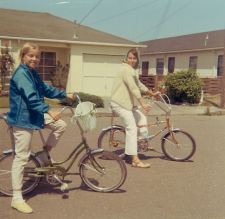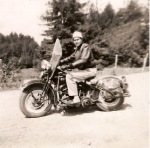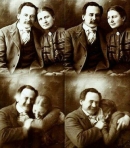
Each year, Women’s History Month highlights amazing, adventurous, iconoclastic women. And, each year, I think of my great-aunt Rena.
Feisty and independent, Irene “Rena” Harrison was born on August 12, 1900 in Usal, California. Her parents were, technically, Finnish immigrants. I say “technically,” because I and all of my cousins were brought up to believe we were Swedish. The truth, however, is my great-grandparents emigrated from a Swedish village in Finland.
Rena was the second child to be born in the new country. She was also the first daughter, growing up during a time when society’s expectations of women were negligible. She ignored society, and pursued a variety of traditionally male-oriented interests.
She taught herself how to drive and build a house (including electrical and plumbing). In fact, she built several houses and an apartment complex. She was a hunter and tracker. When a baby sibling died, she made the headstone.

With her crooked smile, Rena was quite a character and everyone loved her. Well, except her ex-fiancé, who she dumped a few days before their wedding. She said she wasn’t going to have any man tell her what to do. He later became the town drunk.
During World War I, while men were fighting overseas, she filled in job gaps, such as working at a grape packing plant. She also helped make bandages during the deadly 1918 Flu Epidemic, which ultimately killed more people than the war. During World War II, she was a ranch foreman, worked in a cookhouse, and a Ford garage.
Rena had a green Model T, “Tin Lizzie.” The car was always packed with a shovel, toilet paper, blanket and water, because you had to be “ready for anything.”
In the 1920s, she and friend Elna hitchhiked from Fort Bragg to Eureka, sleeping alongside the road on their bedrolls. It took them three days.
Rena could drink with the best of them. After an evening of imbibing bootleg whiskey, she put both legs in one leg of her pajamas, and went to bed. In the morning, she thought she was paralyzed on one side of her body.
She enjoyed living alone. Other women might have been frightened, but not Rena. One night, when a man knocked on her door, she thought he was going to attack her. Instead of hiding, however, she grabbed a piece of wood by the stove, and went running after him yelling, “Stop, you son-of-a-bitch! I’ll kill you!”
At carnivals, she’d play Skin Games; games of chance and skill. One was called Nail Driving. A block of wood had a good-sized nail just started. If you pounded it in with either one or two shots, you’d win a prize. The women working the booth said, “Give the lady three tries,” not knowing Rena was the best carpenter in the family, with very strong arms. Pow! The nail was gone in one. She’d take home the biggest stuffed animal. When the carnival workers changed shifts, she’d go back and do it again.
Rena never married or had children, but she babysat just about everyone in the family. One day, while taking care of a couple of rowdy nephews, her patience ended. Putting hands on her hips, she said, “If you don’t behave, you’re going to hell. Do you know what hell is?” They both shook their heads, mouths open. “It’s 15 feet high full of shit!” They didn’t give her trouble after that.
She’d work at carpentry during the day, and embroider at night. She’d cuss like a sailor, and smoked cigars. She’d help you tie your shoelaces, then build a fireplace.
When they filmed “The Russians Are Coming,” the movie producers were charmed by Rena’s quirkiness. They asked her if she could drive a wagon in the film, warning the town of an “invasion” by Russians. She wasn’t interested, though. She told them she had “better things to do than be in a damn movie.” The part went to actor Ben Blue.
As she grew older, received surgeries on her throat and back, and had to live with a nephew and his wife, she never lost her independent spirit. She would get in her car and just take off.
Rena had a crush on a bartender named Charlie. When she was 84 years old, the night she died, even though she was in a coma, she said, “Set ‘em up, again, Charlie.”
Per her request, instead of a funeral, there was a party. She would have been pleased to know that, in her honor, two of her nieces smoked a cigar.
Rena set an example for the girls in the family that anything was possible, and to not compromise our dreams. She was my superhero.






